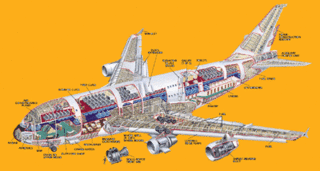The inevitable outcome of government control?
 The safety issues raised in the following articles are interesting but probably insignificant. The odds of being in a plane crash in either a Boeing or Airbus plane are probably equal to being struck by lightning and being struck by lightning while holding a 3 iron aloft, respectively; both are very unlikely. However what the decision making behind these obvious lapses in design reveal is a recognition of the unusual environment in which Airbus exists. However much corporate welfare Boeing receives it’s still a private enterprise largely subject to the same market forces and liabilities as any other company while Airbus appears to be just another corporation, it's really just an extension of the governments of Spain, Britain, Germany, Austria, Belgium and France. This allows Airbus the luxury to pursue a volume business model (more jobs) and be less concerned by profits and quality. The effects of this strategy have been 2 fold: Airbus has supplanted Boeing as the unit sales leader and troubling patterns of safety system failure are beginning to appear. Most troubling is that the Airlines least likely to afford a top notch service crew seem to have the largest Airbus fleets. USAir/AmericaWest are the recent recipients of Airbus aircraft that were practically given away. Those who support initiatives to move to a government controlled healthcare system and support continued monopoly over K-12 education should keep an eye on Airbus in the years to come. However well meaning, government rarely achieves an adequate representation of society’s interests.
The safety issues raised in the following articles are interesting but probably insignificant. The odds of being in a plane crash in either a Boeing or Airbus plane are probably equal to being struck by lightning and being struck by lightning while holding a 3 iron aloft, respectively; both are very unlikely. However what the decision making behind these obvious lapses in design reveal is a recognition of the unusual environment in which Airbus exists. However much corporate welfare Boeing receives it’s still a private enterprise largely subject to the same market forces and liabilities as any other company while Airbus appears to be just another corporation, it's really just an extension of the governments of Spain, Britain, Germany, Austria, Belgium and France. This allows Airbus the luxury to pursue a volume business model (more jobs) and be less concerned by profits and quality. The effects of this strategy have been 2 fold: Airbus has supplanted Boeing as the unit sales leader and troubling patterns of safety system failure are beginning to appear. Most troubling is that the Airlines least likely to afford a top notch service crew seem to have the largest Airbus fleets. USAir/AmericaWest are the recent recipients of Airbus aircraft that were practically given away. Those who support initiatives to move to a government controlled healthcare system and support continued monopoly over K-12 education should keep an eye on Airbus in the years to come. However well meaning, government rarely achieves an adequate representation of society’s interests.
Here’s an article about an Airbus whistle-blower who’s actively being persecuted by the Austrian government for revealing a flaw in the new A380 that could cause a catastrophic loss in cabin pressure:
A year ago, Mangan told European aviation authorities that he believed there were problems with a computer chip on the Airbus A380, the biggest and costliest commercial airliner ever built. The A380 is a double-decked engineering marvel that will carry as many as 800 passengers — double the capacity of Boeing Co.'s 747. It is expected to enter airline service next year.Mangan alleges that flaws in a microprocessor could cause the valves that maintain cabin pressure on the A380 to accidentally open during flight, allowing air to leak out so rapidly that everyone aboard could lose consciousness within seconds.
Most passenger jets have two cabin-pressure valves, with separate motors operating each. Because aircraft makers want redundancy on safety systems, the planes have three motors for each valve, with different chips controlling each motor. The Boeing 777, for example, has cabin-pressure chips made by Motorola Inc., Intel Corp. and Advanced Micro Devices Inc. Most jetliners also have a manual override so that the pilot can take control in an emergency. Airbus has acknowledged that its designers faced challenges as they attempted to reduce the A380's weight. Early on, the company elected to go with four outflow valves on the A380, with only one motor on each valve, which is slightly larger than a cabin window. Each motor uses a TTTech controller chip, and there is no manual override system."Just there, I would not be happy," said Chris Lomax, a retired engineer who helped design the cabin-pressurization systems for Boeing's 737 and 747. "If all four valves [on the A380] were driven wide open, it would be nip and tuck for the crew to get their [oxygen] mask on and begin a descent."
Here’s another article detailing 67 incidents simply involving the nose landing gear of Airbus Aircraft since 1989:
The problems with JetBlue Flight 292 marked at least the seventh time that the front landing gear of an Airbus jet has locked at a 90-degree angle, forcing pilots to land commercial airliners under emergency conditions, according to federal records.
The locking of the nose landing gear on Airbus jets is one of several recurring problems with the plane's nose landing gear.A Canadian study issued last year documented 67 incidents of nose-landing-gear failures on Airbus 319, 320 and 321 aircraft worldwide since 1989.
No comments:
Post a Comment